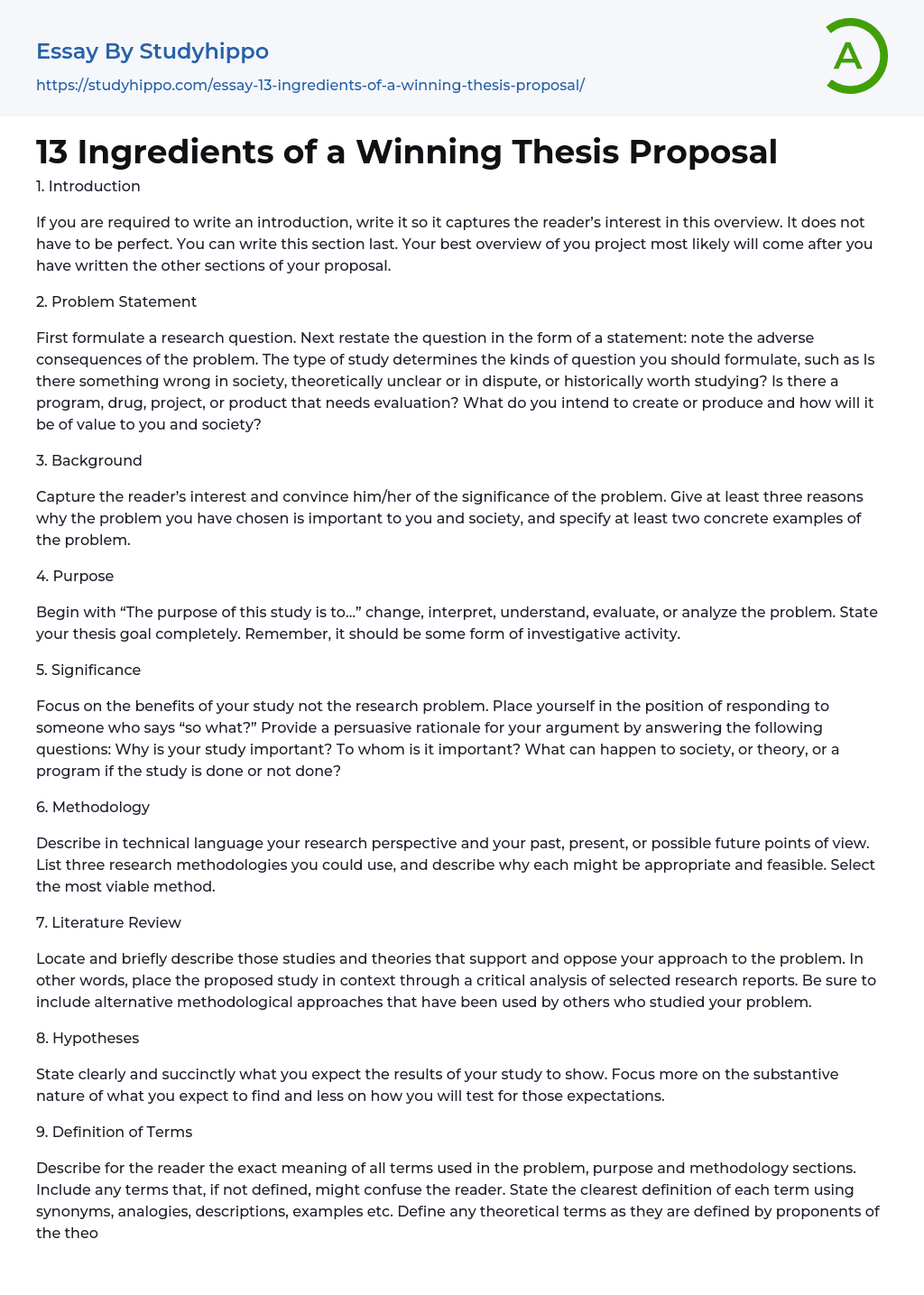

13 Ingredients of a Winning Thesis Proposal Essay Example
1. Introductory Speech
The objective when crafting an introduction is to pique the interest of your reader about this overview. Perfectness isn't required, and you may find it easier to construct this section last. A thorough evaluation of your project will likely become apparent once the rest of your proposal has been written.
2. Statement of the Problem
Start the process by developing a research question. Then, rephrase this question into a statement highlighting the adverse implications of the current problem. The type of your study will guide you in creating relevant questions like, Is there any unsolved social issue that lacks definitive theoretical comprehension and is either debatable or historically significant? Might there be any effort, drug, plan or product that requires evaluation? What are your plans for growth or production and how can they bring about
...positive impacts on yourself and society?
3. Context
Captivate the reader's interest and demonstrate to them why the issue is of importance. Elucidate at least three points that illustrate the relevance of this chosen subject to you and your community, ensuring to offer a minimum of two unique instances that underscore the problem.
4. Objective
Start your investigation by stating "The purpose of this study is to ..." alter, understand, assess, or examine the subject matter. Be sure to express your thesis objective unequivocally. Remember, it should encompass a form of exploratory procedure.
5. Importance
Instead of focusing on the issues your research aims to solve, highlight its strengths. Visualize addressing a skeptic questioning its worth by asking, "why does this matter?". Promot
your study convincingly by responding to these questions: Why is your research crucial? Who stands to benefit from it? What potential effects might it have on society, theoretical ideas, or a program if acted upon or ignored?
6. Approach
Elucidate in technical terms your research outlook and historical, current or prospective standpoints. Enumerate three potential research techniques you might employ, detailing the suitability and practicality of each. Choose the most effective approach.
7. Review of Related Literature
Offer a concise summary of the research studies and theories that either support or dispute your problem-solving approach. To put it another way, broaden the perspective of your proposed study by critically assessing selected research pieces. It's crucial to consider different methodological approaches used by other researchers who have investigated your topic.
8. Assumptions
Explicitly and concisely articulate your projected study outcomes. Concentrate more on the essential content of your anticipated findings and less on the methods you will employ to validate those expectations.
9. Clarification of Terms
Explain to the reader the precise interpretation of all terminologies utilized in the problem, purpose, and methodology segments. Incorporate any terms that could potentially be confusing to the reader if not clarified. Provide the most unambiguous explanation of each term by employing synonyms, analogies, explanations, examples etc. Ensure all theoretical terms are defined according to the interpretations offered by supporters of the theory you are implementing.
10. Presumptions
Explain the untried and unprovable stances, underlying principles, perspectives on the world, or convictions that are inherent in your research. Your evaluation should include your methodological suppositions, such
as your personal viewpoint on various analytical strategies and information collection techniques. Alert the reader to your own preconceptions.
11. Range ; Constraints
Reveal all potential theoretical and methodical constraints. Determine your study's limitations by asking the following: What would be the ideal design, sampling, measurement and analysis schemes in an ideal scenario? How much deviation from these perfect situations is anticipated in your study?
12. Method
Provide a thorough explanation of all the methods you plan to apply in choosing participants, constructing variables, developing theories, gathering and presenting data. This information will aid other researchers in duplicating your research. Remember that just displaying data is not enough for understanding; it requires investigation and interpretation.
13. Distant Impact Consequences
Consider the potential outcomes approximately three years post-completion of your thesis project. What are the enduring impacts if you've completed or not completed the research? The study, if executed well, will either verify your hypothesis, refute it, or possibly yield indeterminate results.
- Agriculture essays
- Albert einstein essays
- Animals essays
- Archaeology essays
- Bear essays
- Biology essays
- Birds essays
- Butterfly essays
- Cat essays
- Charles Darwin essays
- Chemistry essays
- Dinosaur essays
- Discovery essays
- Dolphin essays
- Elephant essays
- Eli Whitney essays
- Environmental Science essays
- Evolution essays
- Fish essays
- Genetics essays
- Horse essays
- Human Evolution essays
- Isaac Newton essays
- Journal essays
- Linguistics essays
- Lion essays
- Logic essays
- Mars essays
- Methodology essays
- Mineralogy essays
- Monkey essays
- Moon essays
- Mythology essays
- Noam Chomsky essays
- Physics essays
- Plate Tectonics essays
- Progress essays
- Reaction Rate essays
- Roman Numerals essays
- Scientific essays
- Scientific Method essays
- Scientist essays
- Seismology essays
- Space Exploration essays
- Stars essays
- Sun essays
- Thomas Edison essays
- Tiger essays
- Time Travel essays
- Universe essays



